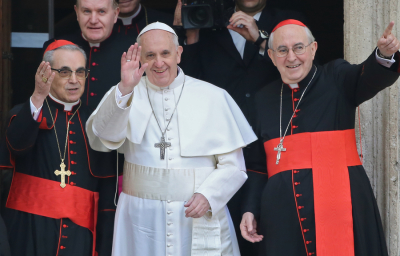Election of Pope Francis: Affirmation of the Church's Shift to the Global South

By means of the decision to elect a non-European, the Catholic Church has clearly accepted and given prominence to the fact that the center of gravity of world Christianity has shifted to the global south. Although popes from Poland and Germany were already a step away from Italy, the new step is away from Europe entirely, to the regions where the masses of Christians live.
It is astonishing that a bishop of the poor has been selected, who as a Jesuit would have been expected to be a closet liberal among the cardinals but by means of the selection of his papal name has indicated that his vow of poverty has programmatic significance. At the Catholic synod meetings last year I got to know him as a modest, humble, and friendly man who uses public transportation and goes without a palace or chauffeur. These are difficult times for all those in the Curia who have tolerated dirty church finances.
We have to expect that the new Pope, perhaps along with Cardinal Turkson from Ghana, who leads the Vatican Commission "Justitia et Pax" (Justice and Peace), will get more strongly involved in social questions. The election of a relatively old man, who is only a little younger than Cardinal Ratzinger was at the time of his election, may mean that he is a transitional figure, though he seems to be healthier than Benedict XVI was at the time of his election.
It must have been self-consciously that a pope who never lived in the Vatican was elected. This will make resolution of the problems of the Curia both easier and more difficult. One will have to wait eagerly for the selection of his Secretary of State.
We hope that the new Pope will have a greater understanding of evangelicals, since they come so predominantly from the global south. There have been some tensions between evangelicals and Catholics in Latin America, but in Argentina the new Pope has neither been known as someone who avoids the needed theological discussions nor describes evangelicals as "sectarian." We can hope for the continuation of truly fair and honest theological discussions of both our differences and commonalities.



























